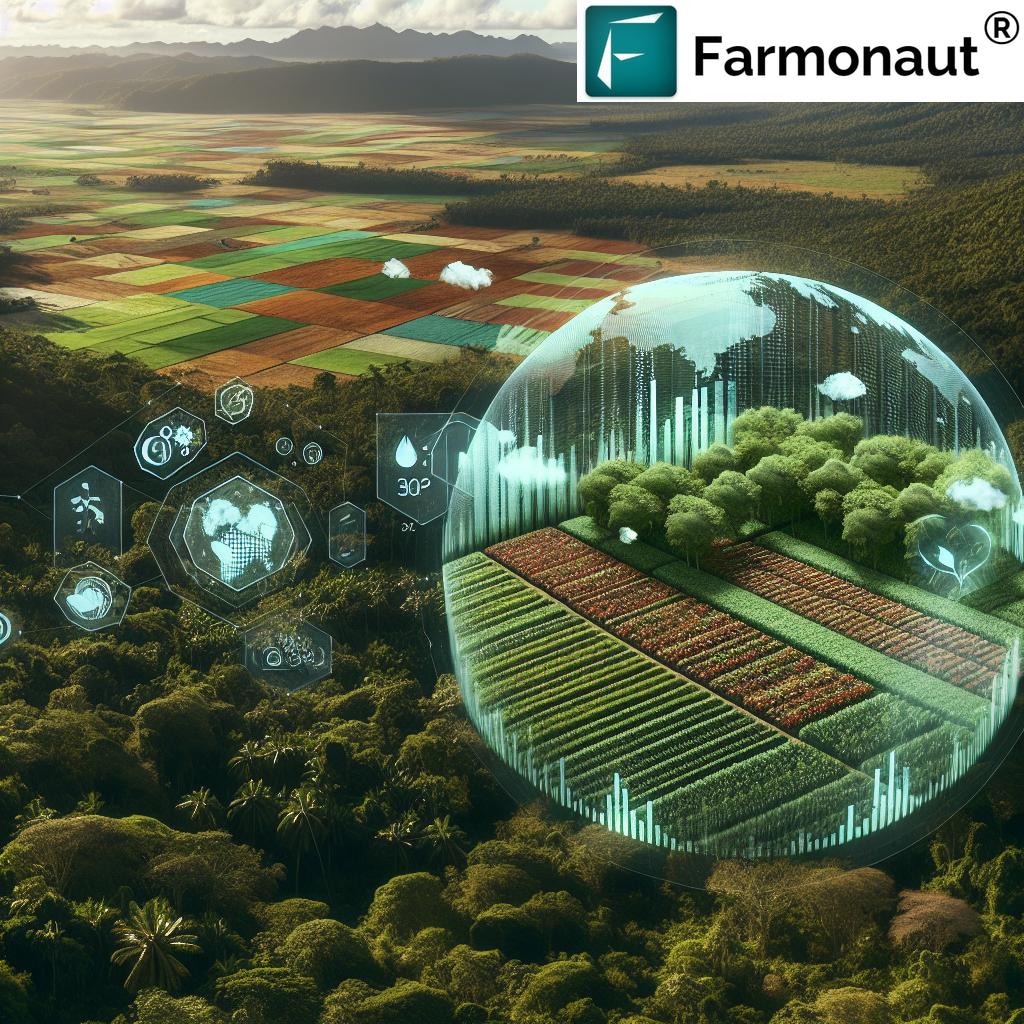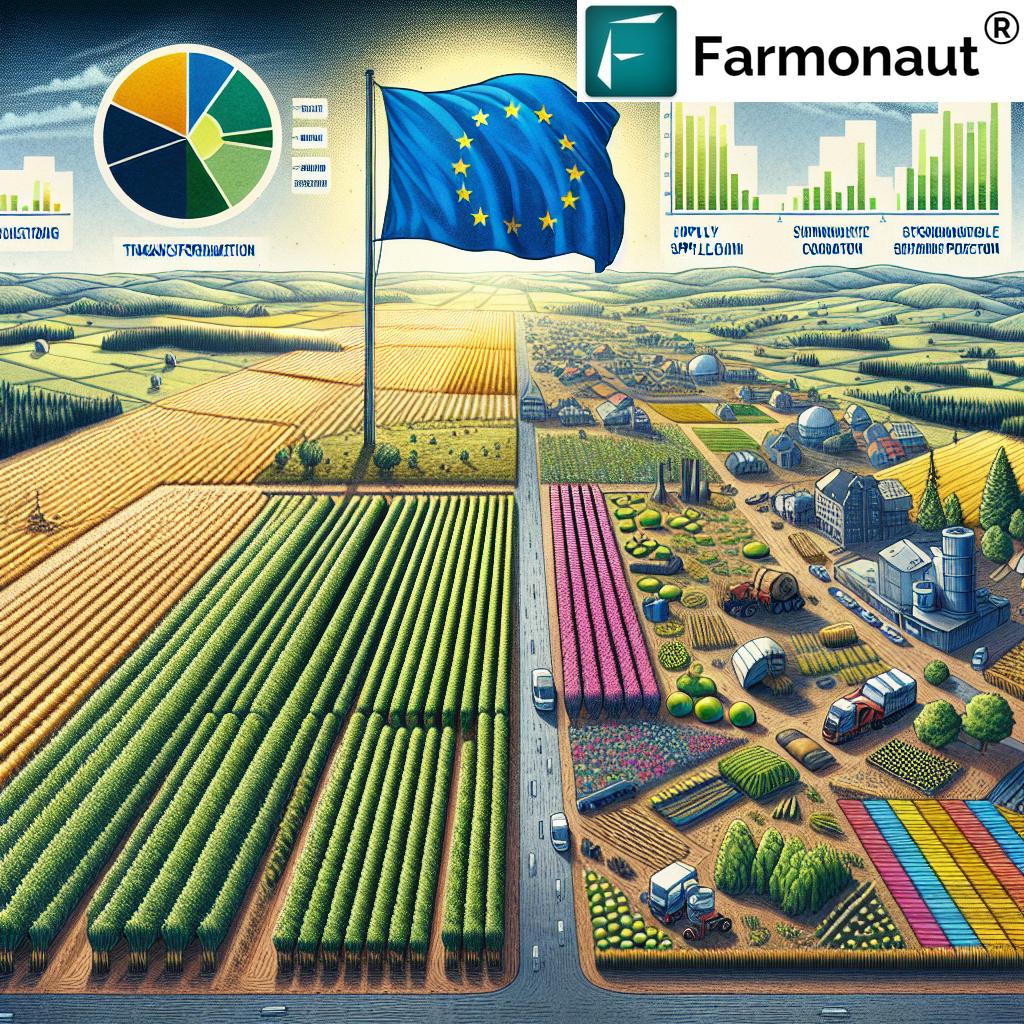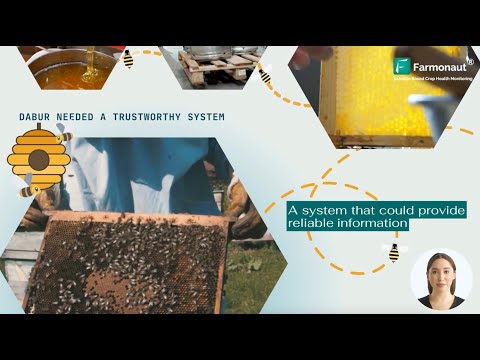EU Deforestation Regulation: Transforming Global Supply Chains for Sustainable Agricultural Commodities by 2025

“The EU Deforestation Regulation aims to transform global supply chains by 2025, impacting billions in trade.”
In the face of escalating climate change and environmental degradation, the European Union has taken a bold step forward with its Deforestation Regulation, set to revolutionize global supply chains for sustainable agricultural commodities by 2025. This groundbreaking initiative places tropical forest conservation and the reduction of greenhouse gas emissions at the forefront of international climate action. As we delve into this complex landscape, we’ll explore the challenges, opportunities, and far-reaching implications of implementing zero-deforestation policies on a global scale.
The Imperative of Deforestation-Free Supply Chains
Deforestation-free supply chains are no longer a lofty ideal but a pressing necessity in our collective fight against climate change. The destruction of tropical forests accounts for a significant portion of global greenhouse gas emissions, making forest conservation a critical component of any serious climate mitigation strategy. The EU Deforestation Regulation recognizes this urgency and aims to leverage the power of global trade to drive positive change.
As we navigate this transformative journey, innovative technologies and solutions play a crucial role. Farmonaut, a pioneer in agricultural technology, offers advanced satellite-based farm management solutions that contribute to sustainable practices and supply chain transparency. Through its web application and mobile apps, Farmonaut empowers farmers and agribusinesses with real-time insights and tools to optimize resource use and reduce environmental impact.
Understanding the EU Deforestation Regulation
The EU Deforestation Regulation is a landmark policy that aims to eliminate deforestation from the supply chains of products sold within the European Union. This regulation will have far-reaching consequences for global trade, particularly in commodities such as palm oil, soy, beef, coffee, and cocoa – all of which have been historically linked to deforestation in tropical regions.
- Scope: The regulation covers both legal and illegal deforestation, addressing a critical gap in previous policies.
- Due Diligence: Companies will be required to conduct thorough due diligence to ensure their products are not linked to deforestation.
- Traceability: Enhanced traceability requirements will be implemented to track commodities from source to market.
- Penalties: Significant fines and potential market exclusion for non-compliant companies.
The implementation of this regulation will require substantial changes in how businesses operate, particularly in their approach to supply chain management and transparency. This is where technologies like Farmonaut’s satellite-based monitoring and traceability solutions become invaluable tools for compliance and sustainable practices.
The Global Impact of EU Deforestation Regulation
The EU Deforestation Regulation is set to have a profound impact on global supply chains, extending far beyond the borders of the European Union. As one of the world’s largest trading blocs, the EU’s policies have a ripple effect across international markets. Here’s how this regulation is poised to transform various aspects of global trade and environmental conservation:
| Aspect | Current Status | 2025 Target | Estimated Impact |
|---|---|---|---|
| Deforestation rates | High in commodity-producing regions | Significant reduction | 30-50% decrease in commodity-driven deforestation |
| Supply chain transparency | Limited visibility beyond tier 1 suppliers | Full traceability to origin | 90% of EU imports fully traceable |
| Sustainable commodity production | Varies by commodity and region | Majority of production certified sustainable | 70% increase in certified sustainable production |
| Investment in deforestation-free initiatives | Underfunded, estimated at $50 billion annually | $200 billion annual investment | 300% increase in funding for conservation and sustainable agriculture |
| Greenhouse gas emissions | High contribution from land-use change | Significant reduction in emissions from deforestation | 1-2 Gt CO2e reduction annually |
| Trade volume of affected commodities | Large volumes, some unsustainable sources | Maintained volume, shift to sustainable sources | 20-30% shift in global trade patterns |
| Implementation costs for businesses | Minimal investment in traceability | Significant upfront costs, long-term savings | 5-10% increase in short-term costs, potential long-term cost reductions |
This comprehensive transformation of global supply chains will require concerted efforts from governments, businesses, and civil society. The challenges are significant, but so are the potential rewards in terms of climate change mitigation, biodiversity conservation, and sustainable economic development.
Challenges in Implementing Zero-Deforestation Policies
While the goals of the EU Deforestation Regulation are clear, the path to implementation is fraught with challenges. Businesses and governments alike must navigate a complex landscape of policy, technology, and market forces to achieve zero-deforestation supply chains. Some of the key challenges include:
- Supply Chain Complexity: Many agricultural commodities pass through multiple intermediaries before reaching the end consumer, making traceability difficult.
- Technical Barriers: Implementing robust traceability systems requires significant technological investment and expertise.
- Economic Pressures: Short-term economic incentives often favor deforestation, particularly in developing countries.
- Governance Issues: Weak governance and enforcement in some producer countries can undermine zero-deforestation efforts.
- Market Leakage: There’s a risk that unsustainable products will simply be diverted to less regulated markets.
Addressing these challenges requires innovative solutions and collaborative efforts. This is where companies like Farmonaut play a crucial role. By providing advanced satellite-based monitoring and AI-driven analytics, Farmonaut helps businesses achieve the transparency and traceability required for compliance with the EU Deforestation Regulation.

The Role of Technology in Sustainable Supply Chains
Technology is at the forefront of the transition to sustainable and deforestation-free supply chains. From satellite monitoring to blockchain-based traceability, innovative solutions are enabling unprecedented levels of transparency and accountability. Here’s how technology is transforming supply chain management:
- Satellite Monitoring: Advanced satellite imagery allows for real-time monitoring of land use changes and deforestation.
- Artificial Intelligence: AI algorithms can analyze vast amounts of data to detect patterns and predict areas at risk of deforestation.
- Blockchain Technology: Immutable ledgers provide a secure and transparent way to track commodities from source to market.
- Internet of Things (IoT): Sensors and connected devices enable real-time tracking of products throughout the supply chain.
- Big Data Analytics: Advanced analytics tools help companies make sense of complex supply chain data and identify areas for improvement.
Farmonaut’s suite of tools exemplifies how technology can be leveraged for sustainable agriculture and supply chain management. Through its API developer documentation, Farmonaut provides businesses with the capability to integrate cutting-edge satellite monitoring and analytics directly into their existing systems.
Financial Implications and Investment Needs
“Experts estimate $200 billion annually is needed for deforestation-free initiatives, highlighting a significant funding gap.”
The transition to deforestation-free supply chains requires significant financial investment. Current estimates suggest that an annual investment of $200 billion is needed to fully implement and maintain deforestation-free initiatives globally. This figure stands in stark contrast to the current level of funding, highlighting a substantial gap that needs to be bridged.
The financial implications of the EU Deforestation Regulation are multifaceted:
- Implementation Costs: Businesses will need to invest in new technologies and processes to ensure compliance.
- Market Access: Non-compliant companies risk losing access to the lucrative EU market.
- Price Premiums: Sustainably produced commodities may command higher prices, potentially offsetting some costs.
- Long-term Savings: Improved efficiency and risk management can lead to cost savings over time.
- Investment Opportunities: The transition creates new opportunities for investment in sustainable agriculture and technology.
To bridge the funding gap, a coordinated effort from governments, financial institutions, and the private sector is crucial. Innovative financing mechanisms, such as green bonds and sustainability-linked loans, are emerging as important tools to channel capital towards deforestation-free initiatives.
The Paris Agreement and Climate Commitments
The EU Deforestation Regulation is intrinsically linked to the global climate agenda, particularly the Paris Agreement. By targeting one of the largest sources of greenhouse gas emissions – deforestation – the regulation directly supports the Paris Agreement’s goal of limiting global temperature rise to well below 2°C above pre-industrial levels.
Key connections between the EU Deforestation Regulation and climate commitments include:
- Nationally Determined Contributions (NDCs): Many countries include forest conservation in their NDCs under the Paris Agreement.
- REDD+ Mechanisms: The regulation complements existing efforts to reduce emissions from deforestation and forest degradation.
- Global Forest Goals: Aligns with international targets for increasing forest cover and sustainable forest management.
- Corporate Climate Pledges: Supports businesses in meeting their voluntary climate commitments.
By driving the adoption of sustainable practices in global supply chains, the EU Deforestation Regulation serves as a powerful tool for achieving climate goals. It exemplifies how trade policy can be leveraged to support environmental objectives on a global scale.
Accountability Frameworks and Progress Monitoring
Effective implementation of the EU Deforestation Regulation requires robust accountability frameworks and continuous progress monitoring. These systems ensure that commitments are translated into tangible actions and that progress towards deforestation-free supply chains is measurable and verifiable.
Key components of accountability and monitoring include:
- Reporting Requirements: Companies must regularly report on their progress towards deforestation-free supply chains.
- Third-Party Verification: Independent audits to validate company claims and ensure compliance.
- Transparency Platforms: Public disclosure of supply chain information and progress towards targets.
- Stakeholder Engagement: Involvement of NGOs, local communities, and other stakeholders in monitoring efforts.
- Technology-Enabled Monitoring: Use of satellite imagery, AI, and other technologies for real-time forest monitoring.
Farmonaut’s technology plays a crucial role in this aspect, offering tools for real-time monitoring and data-driven decision-making. Through its Android app and iOS app, Farmonaut provides accessible solutions for businesses and stakeholders to track and verify sustainable practices.
The Future of Sustainable Agricultural Commodities
As we look towards 2025 and beyond, the landscape of agricultural commodities is set to undergo a profound transformation. The EU Deforestation Regulation is just one part of a broader global shift towards sustainability in agriculture and supply chain management. This shift is driven by a combination of regulatory pressure, consumer demand, and the increasing recognition of the business case for sustainability.
Key trends shaping the future of sustainable agricultural commodities include:
- Regenerative Agriculture: Practices that go beyond sustainability to actively restore ecosystems and soil health.
- Precision Agriculture: Use of data and technology to optimize resource use and minimize environmental impact.
- Alternative Protein Sources: Development of plant-based and lab-grown alternatives to reduce pressure on land use.
- Circular Economy Models: Reducing waste and maximizing resource efficiency throughout the supply chain.
- Climate-Smart Agriculture: Adapting agricultural practices to be more resilient to climate change impacts.
These trends present both challenges and opportunities for businesses operating in the agricultural sector. Companies that can adapt quickly and embrace sustainable practices will be well-positioned to thrive in this new environment.
The Role of Farmonaut in Sustainable Supply Chains
In the context of the EU Deforestation Regulation and the broader shift towards sustainable agricultural commodities, Farmonaut’s technology offerings play a crucial role. By providing advanced satellite-based monitoring and analytics tools, Farmonaut enables businesses to achieve the level of transparency and traceability required for compliance and sustainable practices.
Key features of Farmonaut’s platform that support sustainable supply chains include:
- Real-time Crop Monitoring: Satellite imagery provides up-to-date information on crop health and land use changes.
- AI-driven Insights: Advanced analytics help predict potential issues and optimize resource use.
- Blockchain-based Traceability: Secure and transparent tracking of commodities from farm to market.
- Carbon Footprint Tracking: Tools to measure and manage the environmental impact of agricultural operations.
- Integration Capabilities: APIs allow seamless integration with existing supply chain management systems.
By leveraging these technologies, businesses can not only comply with regulations like the EU Deforestation Regulation but also drive efficiency, reduce risks, and build more resilient and sustainable supply chains.
Conclusion: A Call to Action
The EU Deforestation Regulation marks a pivotal moment in the global effort to combat climate change and protect our planet’s vital ecosystems. As we move towards 2025, the transformation of global supply chains for sustainable agricultural commodities is not just an aspiration but a necessity. The challenges are significant, but so are the opportunities for innovation, collaboration, and positive change.
For businesses, governments, and stakeholders across the supply chain, now is the time to act. Investing in sustainable practices, leveraging advanced technologies, and fostering partnerships will be crucial in navigating this new landscape. Companies like Farmonaut are at the forefront of this transition, providing the tools and insights needed to build truly sustainable and transparent supply chains.
As we embrace this challenge, we have the opportunity to create a more sustainable, resilient, and equitable global food system. The path forward requires commitment, innovation, and collaboration, but the rewards – for our planet, our communities, and our economies – are immeasurable.
FAQ Section
- What is the EU Deforestation Regulation?
The EU Deforestation Regulation is a policy aimed at eliminating deforestation from the supply chains of products sold within the European Union, targeting commodities like palm oil, soy, beef, coffee, and cocoa. - When will the EU Deforestation Regulation come into effect?
The regulation is set to transform global supply chains for sustainable agricultural commodities by 2025. - How will the regulation impact businesses?
Businesses will need to conduct thorough due diligence, ensure traceability in their supply chains, and potentially face penalties for non-compliance. - What role does technology play in implementing the regulation?
Technology, including satellite monitoring, AI, blockchain, and IoT, plays a crucial role in enabling supply chain transparency and traceability. - How much investment is needed for deforestation-free initiatives?
Experts estimate that $200 billion annually is needed for deforestation-free initiatives globally. - How does the regulation relate to the Paris Agreement?
The regulation supports the Paris Agreement’s goals by targeting deforestation, a major source of greenhouse gas emissions. - What are some challenges in implementing zero-deforestation policies?
Challenges include supply chain complexity, technical barriers, economic pressures, governance issues, and the risk of market leakage. - How can businesses prepare for compliance with the regulation?
Businesses can prepare by investing in traceability technologies, conducting supply chain audits, and partnering with sustainable suppliers. - What are the potential benefits of complying with the regulation?
Benefits include maintained market access, potential price premiums for sustainable products, improved efficiency, and reduced long-term risks. - How does Farmonaut contribute to sustainable supply chains?
Farmonaut provides satellite-based monitoring, AI-driven insights, and blockchain-based traceability solutions that support compliance and sustainable practices in agricultural supply chains.



